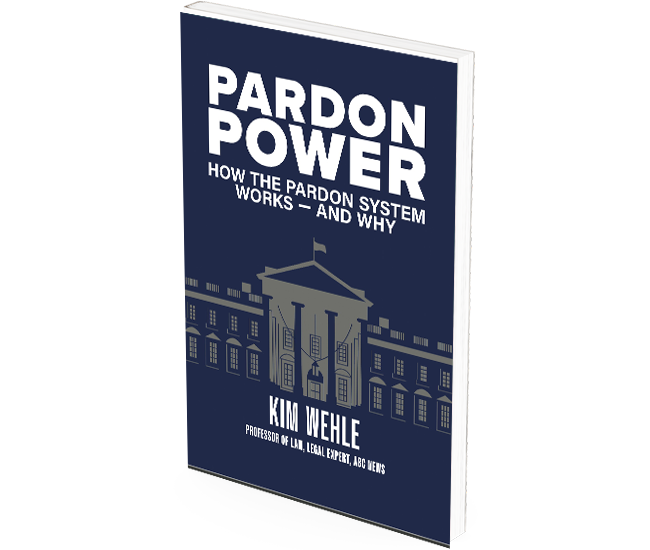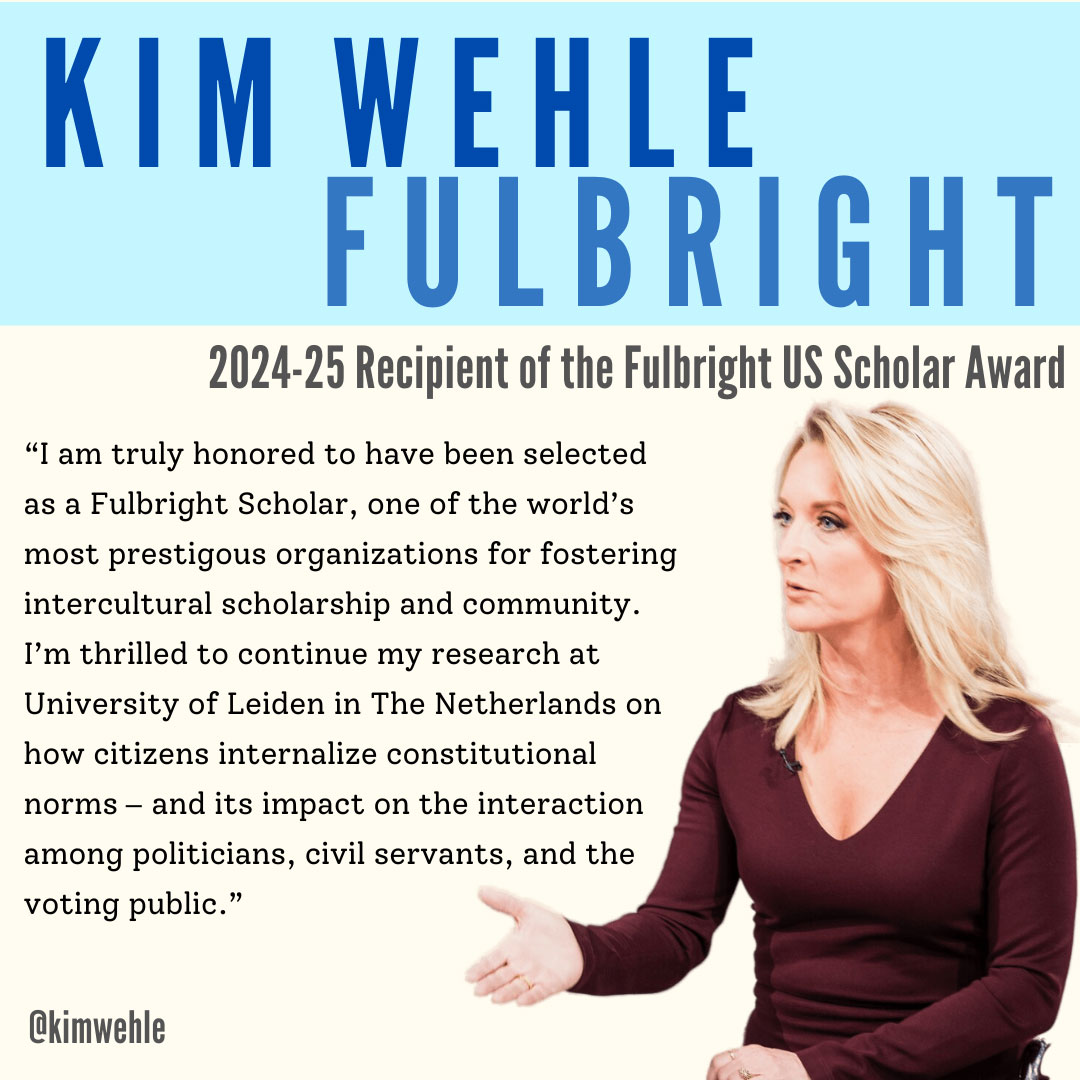Publication date September 2, 2024
By Kim Wehle
PARDON POWER: HOW THE PARDON SYSTEM WORKS — AND WHY
MEDIA KIT
FOR IMMEDIATE RELEASE
PARDON POWER: HOW THE PARDON SYSTEM WORKS — AND WHY
New Book from Kim Wehle, Law Professor and Legal Contributor for ABC News, Takes Readers from the Pardon’s Worthy Beginnings to its Misuse in Modern Times Foreword by John W. Dean, Counsel to the President of the United States (1970-73), Nixon White HouseJuly 10, 2024 -- Woodhall Press announced today that it will publish Pardon Power: How the Pardon System Works -- and Why, on September 2, 2024, the latest book by Kimberly Wehle, acclaimed author, law professor, legal analyst, and Legal Contributor for ABC News. She also appears regularly on CNN, C-SPAN and NPR News.
Pardon Power will be released just weeks before the 2024 election. Against this timely backdrop, Wehle takes readers on a fascinating historical journey from British monarchs’ early uses of the pardon — when it was moored in righteous intent — to its misuse in modern times to subvert the American rule of law.
FACTS & HISTORY ABOUT THE PARDON
WHAT IS A PARDON? A pardon is the absolution of a person for a crime. For federal crimes, the pardon power rests solely with the president. For state crimes, the pardon power varies — not all governors can wipe away a criminal record with the stroke of a pen.
ARE THERE DIFFERENT TYPES OF PARDONS? Pardons exist in two forms: legitimate pardons that serve their intended purposes of mercy or remedying injustice; and illegitimate pardons that serve as favors for wealthy donors, supporters, and family members that disserve the rule of law.
WHY DOES THE PARDON EVEN EXIST? In theory, pardons exist to enable mercy for individuals who are unjustly treated or amnesty to heal a nation. The framers of the Constitution borrowed the concept from England’s monarchy, and exists in every country across the world except China.
WHO CAN BE PARDONED? Presidents can issue pardons for any federal crime with few limits and without explanations. The power is far more constrained in some states than for presidential pardons.
WHY DOES THIS MATTER NOW? WHAT ARE THE IMPLICATIONS FOR THE 2024 ELECTION? Donald J. Trump is the first president to realistically present the country with the possibility of a self-pardon. He dangled a self-pardon while in office, and if he were to pull one out to challenge the indictments against him for his role in the plot to overturn the 2020 presidential election and his mishandling of classified documents after he left office, it would throw the country into another constitutional crisis. Trump has also repeatedly and publicly promised blanket pardons for those charged with or convicted of crimes committed during the January 6th insurrection (more than 1,265 people).
WHAT PEOPLE ARE SAYING ABOUT THE NEWEST BOOK FROM KIM WEHLE
"In Pardon Power, Kim Wehle debunks the orthodoxy that the President’s pardon power has no limits and argues persuasively that its use for corruption has no place in our system of laws. A must-read for those who care about the fate of American democracy."
Charlie Sykes, MSNBC contributor & columnist and author of How The Right Lost Its Mind"Taking the reader on a fascinating historical journey from the ancient holy scriptures to January 6, Wehle highlights how an ecclesiastical instrument intended to correct for unfortunate guilt,' ... can (and has) become weaponized by occupiers of the Oval Office intent on subverting the rule of law. Wehle's analysis is a must-read for anyone who cares about creating transparency & accountability in one of the most awesome powers of the presidency."
Asha Rangappa, Former FBI Agent, Former Associate Dean at Yale Law School, Senior Lecturer at Yale UniversityMedia Highlights
-
Sirius XM with Eliot Williams
September 24, 2024
-
Podcast: Sidebar
September 17, 2024
Pardon My Concerns: Should We Put Limits on the Pardon Power?
-
Podcast: Open Book with Anthony Scaramucci
September 16, 2024
-
C-SPAN, After Words
To Air on September 15, 2024
After Words: Kim Wehle discusses how the pardon system works in the US
-
MSNBC, The Katie Phang Show
TBD September 14, 2024
-
Podcast: Utterly Moderate
September 11, 2024
-
Webinar: Society for the Rule of Law
September 10, 2024
-
CNN, The Lead with Jake Tapper
September 9, 2024
-
Brian Tyler Cohen
TBD September 9, 2024
-
Maryland Public Television
September 9, 2024
-
Podcast: Stand Up with Pete Dominick
September 8, 2024
-
Podcast: Beg to Differ (The Bulwark)
September 6, 2024
-
MSNBC, Morning Joe
September 6, 2024
-
ABC News Live
September 6, 2024
-
CNN, The Laura Coates Show
September 5, 2024
-
Podcast: Beyond Politics
September 5, 2024
-
Substack: If You Can Keep It
September 5, 2024
The dangers of an unchecked pardon power. Kim Wehle on pardon abuse and the urgency of reform
-
Justice Matters with Glenn Kirschner
September 4, 2024
-
WYPR, Weekend Edition
September 4, 2024
-
NPR, Morning Edition with Steve Inskeep
September 3, 2024
Constitutional law scholar Kim Wehle explains how the pardon system works
-
The Bulwark
September 3, 2024
Can the President Pardon Himself? Logic says no, but the precedent isn't as clear, excerpt from Pardon Power, by Kim Wehle
-
The Julie Mason Show, Sirius XM
September 3, 2024
Kim Wehle on Her New Book Pardon Power: How the Pardon System Works — and Why
-
Slate Podcast: Hear Me Out, with Celeste Headlee
September 3, 2024
Presidential Pardons Need Reform, But yes, they’re a force for good, too.
-
Podcast: Presidential Histories with Kenny Ryan
September 2, 2024
-
The Don Lemon Show
August 30, 2024
-
WTOP
August 26, 2024
-
Podcast: Beerocracy!
August 21, 2024
-
The Jack Hopkins Show
August 17, 2024
Pardon Power: Kimberly Wehle on Presidential Pardons, Legal Quagmires, and Safeguarding Democracy
-
Podcast: Keeping Democracy Alive with Burt Cohen
July 25, 2024
The Power of Pardons and Democracy, a conversation with Kim Wehle
-
Podcast: Jen Rubin’s Green Room
July 24, 2024
”Like all discretionary authority, the pardon power is only as virtuous as the person who controls it. Kimberly Wehle demonstrates that it can be a righteous tool to remedy wrongful convictions, reduce excessive sentences, and recognize extraordinary rehabilitation, but it also can be used to obstruct investigations, benefit political allies, and reward people for paying the President’s friends.
Professor Wehle’s timely book illuminates a vast constitutional power likely to be debated during the 2024 presidential campaign and beyond.
Rod RosensteinDeputy Attorney General, Trump Administration

